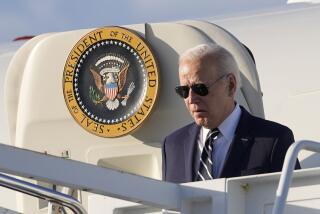U.S. Embassy orders non-emergency staff to leave Iraq immediately as tensions with Iran rise
The U.S. Embassy in Baghdad on Wednesday ordered all nonessential, non-emergency government staff to leave Iraq immediately amid escalating tensions with Iran. Washington did not publicly provide any evidence to back up claims of an increased threat from Tehran.
The action comes as the U.S. is deploying an aircraft carrier strike group and B-52 bombers into the region in response to the still-unspecified Iran threat, further ramping up tensions a year after President Trump withdrew America from Tehran’s nuclear deal with world powers.
The Trump administration’s assertions have been questioned by Iraq and some European allies.
On Tuesday, Maj. Gen. Chris Ghika, a British deputy commander in the U.S.-led coalition against Islamic State in Iraq, said “there’s been no increased threat from Iranian-backed forces in Iraq and Syria.”
The U.S. Central Command responded that Ghika’s comments, made to reporters at the Pentagon via a video link to Baghdad, “run counter to the identified credible threats available to intelligence from U.S. and allies regarding Iranian backed forces in the region.”
In a speech late Tuesday, Iran’s supreme leader stated that “no one is seeking war,” but that it wouldn’t be difficult for the Islamic Republic to enrich uranium to weapons-grade levels, state media reported.
Ayatollah Ali Khamenei’s comments came after Yemen’s Houthi rebels, who are backed by Iran, launched a coordinated drone attack on a crucial oil pipeline in Saudi Arabia, which leads a coalition supporting the internationally recognized Yemeni government. A satellite image obtained by the Associated Press shows one of the two pumping stations attacked by the drones apparently intact.
The drone assault is just the latest incident in the Mideast to shake global energy markets, as authorities allege oil tankers anchored off the coast of the United Arab Emirates were targeted by sabotage. Benchmark Brent crude prices remained around $71 a barrel in early trading Wednesday.
Speaking in Tehran at an iftar, the traditional dinner Muslims have when breaking their daylong fast during the holy month of Ramadan, Khamenei’s reported comments first focused on him downplaying the chances of a wider conflict in the Mideast with the U.S.
He reportedly told senior officials that his country won’t negotiate with the United States, calling such talks “poison.” But he also said, “Neither we, nor them is seeking war. They know that it is not to their benefit.”
In Wednesday’s edition, the state-run newspaper carried his comments on the nuclear program, his first since Iran announced it would begin backing away from the accord itself.
Tehran is threatening to resume higher enrichment in 60 days if no new nuclear deal is in place, beyond the 3.67% permitted by the current deal between Tehran and world powers.
More to Read
Start your day right
Sign up for Essential California for news, features and recommendations from the L.A. Times and beyond in your inbox six days a week.
You may occasionally receive promotional content from the Los Angeles Times.






